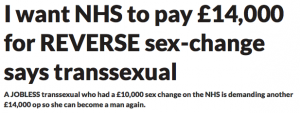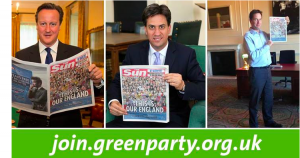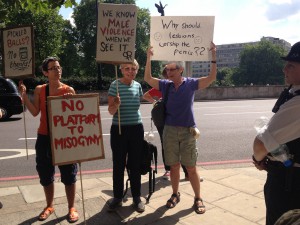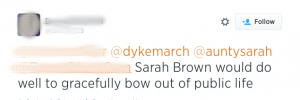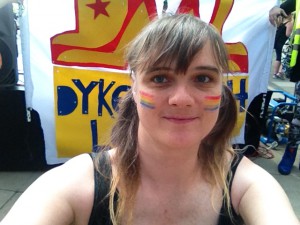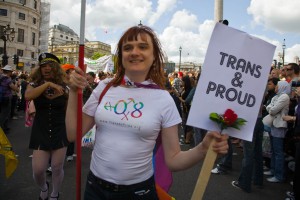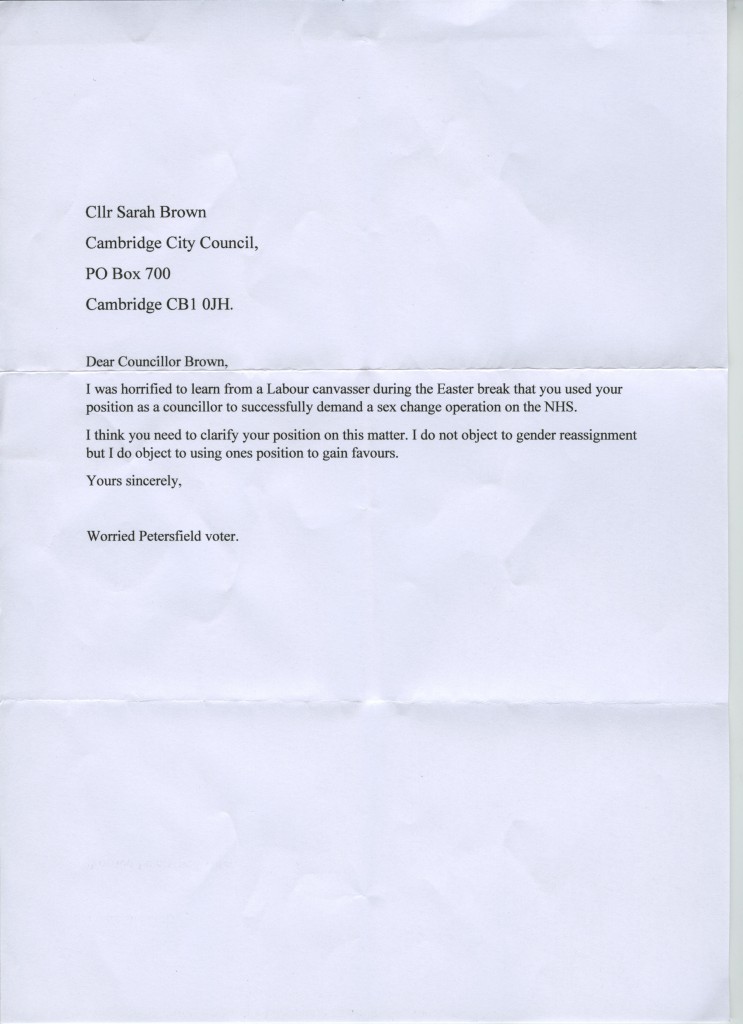Various people close to me know I’ve had a bit of a tough time this year. Few know the full story. I didn’t want to talk about it before the local elections, but now they’re out of the way, I want to be clear about it.
Why am I doing this? Well, I’ve been involved thoughout my 4 year term as a councillor in health, in one way or another. The first three years I sat on the county’s health scrutiny committee. The last year, I was a member of the health and wellbeing board itself, and also held portfolio responsibility for public health on Cambridge City Council.
I’ve always said we need to be more open about mental health. 1 in 3 of us will experience mental health problems, yet we so often feel unable to talk about it.
I want to talk about it.
I have experienced mental health problems. This is my story.
Towards the end of 2013, I started to realise I was struggling with my workload. I was juggling a lot of balls: On the council, I had public health, arts and leisure, community development, and was Cambridgeshire’s appointed board member to the UK Tour de France company.
Elsewhere, I’d been really active in the campaign for equal marriage; I knew I faced a difficult reelection campaign; LGBT history month (February) was coming up. I’d been invited to speak at a lot of stuff around the country.
I realised I had got myself in a position where I had taken on too much, and I knew if I tried to “soldier on”, it would get worse, and I’d crack. I was stressed, anxious and starting to get depressed. I needed help.
I talked to my colleagues about this, and then went to see my doctor. This helped: my colleagues they rallied round to take some of the workload off and my doctor, after talking through the options, prescribed an antidepressant called Mirtazapine.
Things started to look up. January rolled into February, and then I had a “paradoxical reaction” to the drug. It effectively sent me into a 3 day long panic attack.
I went to see my GP, who confirmed I was having an adverse reaction, and he stopped them immediately. He prescribed a low dose of another antidepressant, Citalopram, and also gave me some Diazepam (Valium) to help me through the switchover.
This seemed to do it. Everything was getting better. I was feeling OK, but tired (I wasn’t sleeping well on the Citalopram, but my doctor was willing to give me more Valium to help, having proven “I could be trusted with it”). People who knew I’d been struggling said I was looking better. I felt OK. As long as I didn’t try to take on too much again, and was aware that the drugs were making me tired, I felt I could get through to May and then things would ease off, whatever happened.
Then it all went horribly wrong. Enter transphobia, stage left.
Those LGBT history month events I’d been asked to speak at. One was at a conference called, “Feminism in the 21st century”, and I was to be part of a panel talking about the place of trans women in feminism.
The organisers hadn’t been great about keeping in touch, and I had to keep bugging them. Eventually, some weeks after it was promised, they sent me a speaker pack. It was then that I realised they’d arranged for me to be on a panel with Julie Bindel, a journalist known for some deeply unpleasant views about trans people, and who has a habit for using such occasions to try and advance them.
This wasn’t what I thought I’d signed up for, and I emailed the conference organisers to explain my reticence, and said that I reluctantly would withdraw from the panel. This worked for me; I didn’t want to get into a protracted fight with them about this, and I was trying to do less stuff anyway, given my mental health was already a bit fragile.
What happened next is kind of hazy, but as far as I can tell, Ms Bindel reacted very poorly. Apparently the NUS had been lobbying the conference organisers about Bindel’s participation, and the panel on which we had been due to speak was cancelled as a result. She apparently blamed me for this, and a few people with whom she seemed to be friends online started putting the story about that I had orchestrated the whole NUS campaign. The way they told it, I was some sort of evil genius.
I was in no position to orchestrate anything; I was already struggling with my workload, and I hadn’t even known about the existence of the student campaign. I just wanted to walk away, but there are a lot of people on the fringes who call themselves radical feminists, who really, really hate transgender women, and it seems a bunch of them took it upon themselves to “punish” me for this.
They started harassing me on Twitter. I blocked them, but when they’re constantly talking about you, and you’re already feeling anxious, it can be difficult not to look. They were talking amongst themselves in stage whispers about me (so-called “subtweeting”); about how they were going to try and get me in trouble by writing complaint letters to anyone they could.
And they did.
I got a phone call from the leader of the council. A complaint had been lodged with liberal democrat central office in London. Someone had trawled back through ancient history and found something I’d written about Ms Bindel in 2008, 5 years ago. They then took a single sentence from this (without context, which was that Ms Bindel was actively attacking the trans community at the time, and publicly advocating that our medical help should be taken away and we should be pushed into “ex-trans” therapy), and said it showed that I was someone who “harassed women online”.
I don’t harass women online. I was rude to one transphobic person 5 years ago, at a point when she was engaging in some pretty extreme provocation of my entire community.
But the fact that I was now under active investigation hit me very hard. I had to defend myself. A second complaint arrived, this time at my MP’s office (they knew the background and threw it away, thankfully). I needed to explain the back history and give a crash course in transphobic radical feminism to my colleague who had no background in any of this. These people were actively discussing how to try and hurt me next online. I could see it all. I didn’t know where the next punch would come from. I was terrified.
My already fragile mental health collapsed. I went into severe anxiety and depression. I locked my twitter down, and told a very select group of people what was happening. Some people noticed I started to miss some scheduled meetings: “Councillor Brown sends her apologies, she is unwell” was the line.
The reality: Councillor Brown was curled up under her bed sheet, tranquillised up to her eyeballs, terrified, crying and barely in a position to feed herself, let alone attend a committee meeting.
The complaint was dismissed. It was ancient history, it was out of context, it was “equally vitriolic on the other side”. I saw my doctor. I sat there a gibbering wreck in front of him. I explained what had happened. What was still happening. He increased my antidepressant dose, and gave me more tranquillisers.
But the harassment continued. A few weeks later, my blog, this blog, started suffering a denial of service attack. Then my email was hacked, and used to send spam messages. I thought it a coincidence until I heard that a friend online had also had her online details compromised. This time, they’d taken money from her bank account, signing her up for fake services. Someone else came forward – something similar had happened to her.
The timescale for all three was identical, and the only thing we had in common was that we’d all been targeted by the same small group of online bigots. In their case, it was over race. In my case, it was because I was trans. It all led back to the same group of people though.
I got an anonymous letter, accusing me of abusing my position to “demand a sex change”, allegedly from a constituent, but sent to me via an odd route.
I cut back as much as I could. The meetings I had to go to typically had me withdrawn and quiet, bags under my eyes. I said as little as possible. Everyone was really great. People came up to me and said that they were “so sorry for what these bastards are doing to you”, and not just from my own side either; Labour opposition councillors also rallied round. They wanted no part, they said, in an attack based on anti LGBT prejudice.
Then I became involved in a discussion about parallel imports of HRT for transgender women, and how it was getting more difficult for women to get hold of the drugs we need. A complaint was sent directly to Cambridge City Council, and to the local press: I was encouraging people to break the law, it said.
The complainant’s email was forwarded to me. It was one of the people in active discussion with the group who’d been harassing me, by now, for over 3 months. None of them were Cambridge residents, some of them didn’t even live in the UK, but they were determined, it seemed, to throw everything they could at me until – I don’t know what.
That complaint was dismissed. By now I’d reached a sort of equilibrium. I was tired, but the antidepressants made it hard for me to sleep without tranquillisers. Tranquillisers are addictive though, and lose their effectiveness if you keep taking them, so I rationed their use, saving them up for nights before days I needed to be awake, and never allowing myself to take them 3 days in a row, no matter how bad things got.
I sort of muddled through. My twitter was locked down again, I’d pretty much stopped tweeting at all. I planned my weeks around when I could manage to be awake for a few hours, to do the work I needed to do. I prioritised the portfolio work, public health, Muslim women’s swimming, Tour de France, grants review, and so-on.
The election came and went. We fought the best we could under the circumstances. I had the biggest swing to the Lib Dems in the city from last year’s elections, which I think shows I had a huge personal vote, but it wasn’t enough. I lost.
I’m sad I lost, and I want to be back, but in a way I think I need a bit of a break. I’ve been to a very dark place these last few months, and I don’t ever want to go there again.
I’m off the drugs now. I have considerably beefed up my approach to online security. I feel like I’m in convalescence. The attacks have largely stopped – I think they’ve run out of ways to attack me, and perhaps they see me losing my seat as some sort of victory. If them thinking that they won is what it takes to get them off my back, then fine, they won.
This hasn’t been easy to write, but I wanted to do it, and I think I needed to do it. I blanked a lot of what happened, and remembering the rest isn’t pleasant. I’m incredibly lucky to be surrounded by people who, when things got bad, helped me. I’m lucky to be financially secure, so I wasn’t in danger of falling into poverty while this was going on. I can see how it could have been very different, and if anything it has made me want to fight harder for mental heath problems to be taken more seriously by politicians, by the media, by all of us.
But not right now. I want a rest, ok?

